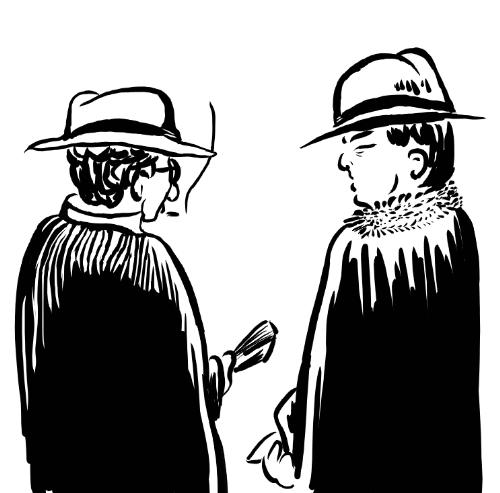
News
Summers Will Not Finish Semester of Teaching as Harvard Investigates Epstein Ties

News
Harvard College Students Report Favoring Divestment from Israel in HUA Survey

News
‘He Should Resign’: Harvard Undergrads Take Hard Line Against Summers Over Epstein Scandal

News
Harvard To Launch New Investigation Into Epstein’s Ties to Summers, Other University Affiliates

News
Harvard Students To Vote on Divestment From Israel in Inaugural HUA Election Survey
What Dark Secret ‘Lies’ Beneath
HLS grad’s novel spans World Wars and revolutions

The scope of “Silent Lies,” the first novel by Harvard Law graduate Mary Lee Malcolm, is breathtaking.
Malcolm sweeps her protagonist through both World Wars, the
Hungarian revolution, and the beginning of the Chinese Civil War. He is
seduced at the age of 14 and blackmailed by Shanghai gangsters. He
commits murder and adultery, renounces Judaism, and loses both real and
foster family to violence.
One might complain that the pace lends itself to
superficiality. But though the novel may not match Malcolm’s epic
ambitions—at times the plot is forced and the loose ends tied too
neatly—its shortcomings do little damage to the readability of the
novel.
“Silent Lies” traces Leo Hoffman in his evolution from
Hungarian peasant boy to American spy. Alienated from his family by his
intelligence and appearance, Leo attracts the attention of his teacher,
a member of the Hungarian bourgeoisie, performing a turn of the century
Teach for America stint. The teacher convinces Leo’s family to send him
to Budapest for schooling. There he meets the Countess Julia, a friend
of his foster mother who initiates him to the ways of sex at the tender
age of 14.
If that occasion, and those that follow, seem gratuitous,
Malcolm explains in an interview with The Crimson that
she intended the episode to account for the gradual dissolution of
Leo’s moral fiber.
“If you grow up without a strong moral compass and you are
corrupted at an early age, it takes something for you to get back on
track,” she says. “The inability to engage in self-denial is one of the
things that keep people from getting back on track.”
Leo’s gift for languages draws the attention of the rising
fascist government, which recruits him as a translator. This takes him
to Paris, where he meets the love of his life, who agrees to marry him
on the strength of one pastry. But a twist of events sparked by the
discovery of his Jewish heritage forces him to flee to Shanghai to
start anew.
As the title of the novel indicates, Malcolm intends to
explore the consequences of fleeing and, if not forgetting the past,
then omitting it. Leo’s efforts to protect his family from the truth
range from the understandable (blindfolding his daughter as they pick
through the debris of a bombing) to the absurd (refusing to tell his
wife about his financial devastation).
His secrecy opens Leo to manipulation by gangsters and the
American military, and it threatens to destroy his relationship with
his family.
More devastating for the novel itself is the way it
infantilizes the women in Leo’s life. Their perpetual innocence about
the reality of their lives makes strong female characters hard to come
by.
Part family saga, part spy thriller, “Silent Lies” has an old-fashioned feel.
The same third person narrator tells of Leo’s adventures both in the bedroom and on the battlefields.
While Leo and Martha’s post coital conversations bear witness
to their love, Malcolm’s statements about European reaction to the
Chinese Civil War, or her summary of World War One, feel stilted and
awkwardly placed, merely mechanisms to get the action moving again.
One is reminded of the message constantly being hammered home in writing classes—show, don’t tell.
“Silent Lies” has the feel of a first time novel, which it is.
Although the reader may not feel an emotional urgency on behalf of Leo,
the plot takes enough twists and turns to make the ride agreeable.
—Staff writer Natalie I. Sherman can be reached at nsherman@fas.harvard.edu.
Silent Lies
By M.L. Malcolm
Longstreet Press
Out Now
Want to keep up with breaking news? Subscribe to our email newsletter.
